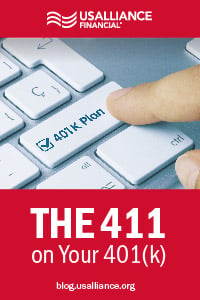
With most employers, a new job comes with new benefits.
Sometimes this includes a vacation package, health care and a 401(k). Often times, your 401(k) is the one benefit that you’d much rather read later. And before you know it later turns into three years. So before you close your benefits folder and lock it away in your office drawer, get the 4-1-1 on some 401(k) basics. A 401(k) is a retirement savings plan that allows you to set aside a portion of your wages before taxes. On average, employees set aside between 3 to 10% of their wages (an annual maximum of $18,500 as of 2018) to go towards their retirement savings. And if you’re over 50, you can play catch up and contribute even more- up to $24,500 per year as of 2018.
What's matching?Some employers will match your contributions to your 401(k). To put it simply, it’s like free money. For every dollar you put in your 401(k), many employers will match that dollar up to a certain percentage. Every company has a different standard, so read your benefits package closely.
What's vesting?Vesting refers to the right you have to the money that is being contributed to your retirement savings. Some employers require that you wait a few years before you can access the full amount of their matching dollars and some have you on a vesting schedule based on you receiving a percentage of your company’s matching dollars. For example, if you leave your company before you are 100% vested, you may lose your company’s contribution to your 401(k), but you will always be fully vested in the contributions you make to your own 401(k) savings plan.
Do I pay taxes on my 401(k)?The only time you will pay taxes on your 401(k) is when you take money out. You don’t have to pay any taxes on the money you contribute. For example, if you make $100,000 a year and $10,000 goes into your 401(k), you will only pay taxes on $90,000. It is highly recommended to consult your tax advisor on any tax questions you might have in regards to your 401(k).
What happens to my 401(k) when I leave my job?
The money is all yours! You can cash it, but then you would have to pay taxes on it and an additional penalty if you’re under a certain age, 10% if you’re under 59 1/2. Or you could roll it over into an IRA.

So, are you ready to tackle your benefits package?
Hopefully you're ready to plan for retirement with more confidence. But there's many more investment options to help you prepare for a secure financial future.


Comments